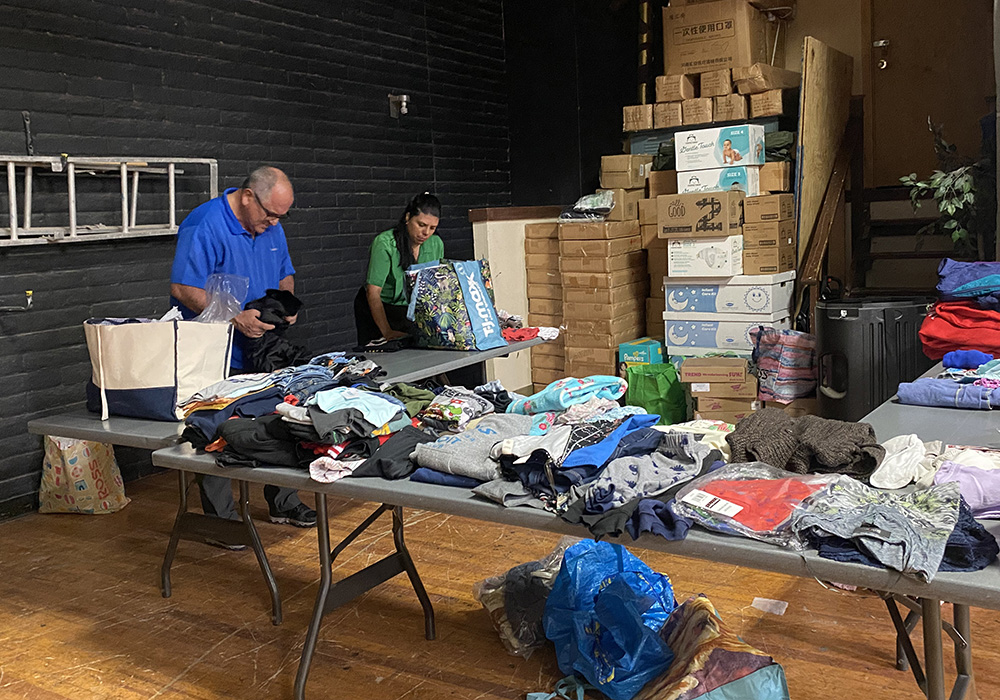
Fr. Gustavo Meneses sorts and folds clothes for migrants May 13 at a temporary shelter the Diocese of El Paso set up to care for migrants at Our Lady of Assumption Parish in El Paso, Texas. The diocese has been working with local governments and organizations to prepare for an influx of migrants in the border city. (NCR photo/Rhina Guidos)
Fr. Gustavo Meneses said he felt a "tense peace" in El Paso after a pandemic-era health rule expired, opening up the way for migrants to once again apply for asylum at the U.S. border with Mexico — something that has been largely curtailed since the coronavirus pandemic began.
"The expectation had been high," with predictions of an overwhelming flow of migrants into the U.S., as Title 42 of the Public Health Services Act ended late May 11, said Meneses, a member of the Vatican's Dicastery for Promoting Integral Human Development who also coordinates a migration ministry in Costa Rica.
The priest said he was in El Paso to show solidarity with the border diocese and tend to a large group of migrants that had been expected to cross the border as Title 42 ended. Instead, Meneses said he was "thankfully surprised" that predictions of large-scale disaster didn't materialize and he instead spent some of his time folding clothes and getting other preparations ready in the diocese's temporary shelter.
The Trump administration put in place Title 42 in March 2020 and, though there were some exceptions, by and large, it allowed Border Patrol agents to rapidly expel those seeking to apply for asylum in the U.S., saying it was a measure taken to keep Covid-19 infections down.
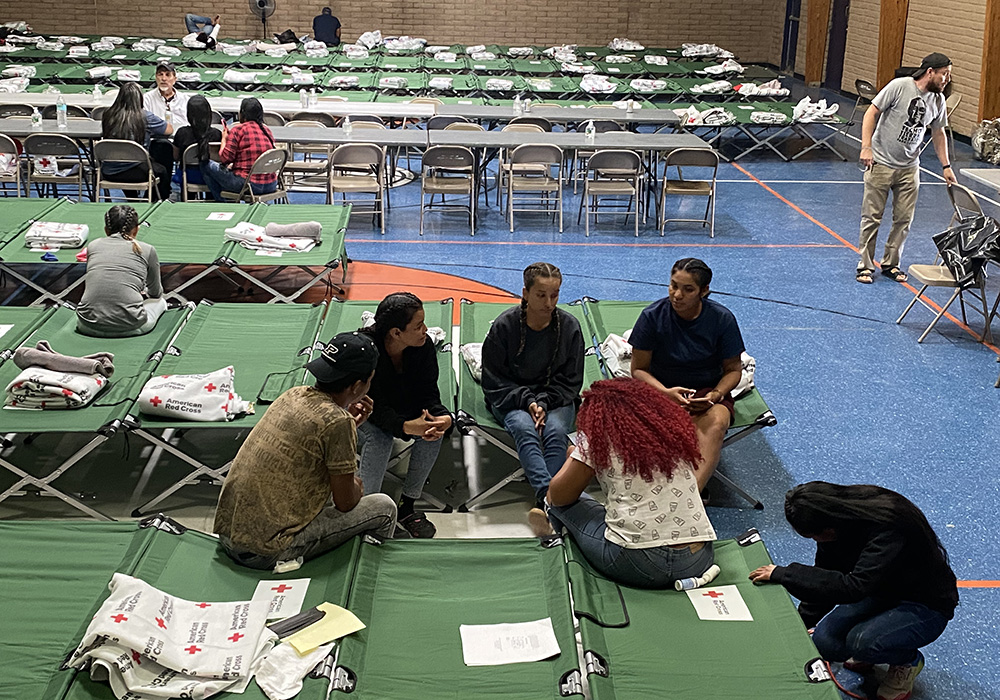
Migrants rest and plan their trip ahead May 13 at a temporary shelter the Diocese of El Paso set up at Our Lady of Assumption Parish in El Paso, Texas. The diocese has been working with local governments and organizations to prepare for an influx of migrants in the border city. (NCR photo/Rhina Guidos)
Many Catholic organizations, including women religious, Catholic social justice groups and some bishops, long had been calling for the policy to end.
Its lifting, however, comes with uncertainty about what's to come, as those who work with migrants and those who oppose immigration are trying to untangle yet-to-be finalized immigration policies and rules recently unveiled by the Biden administration.
"We don't know what the future looks like," said Dylan Corbett, executive director of Hope Border Institute, which works closely with the Diocese of El Paso on immigration matters. "Unfortunately, I think the Biden administration had a real chance to put in place a humane and effective system. That hasn't happened and now we have to deal with the consequences and now one of the consequences is uncertainty."
The other consequence is the bottleneck Title 42 has caused, Corbett said. El Paso's migrant crisis dashboard showed that U.S. Customs and Border Protection reported 5,700 migrants in custody on May 14.
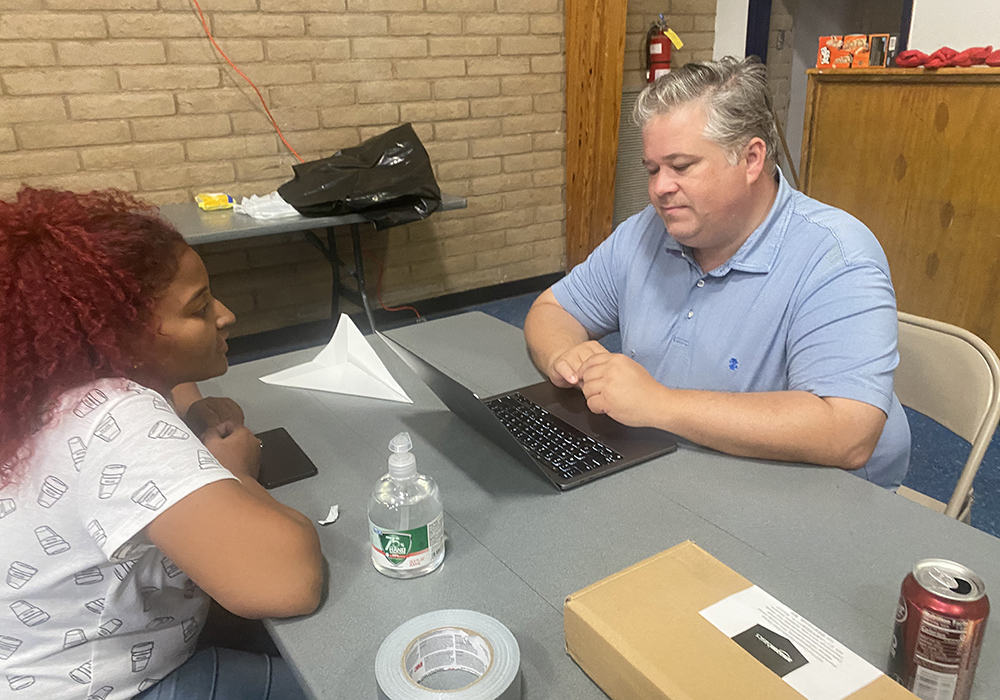
Dylan Corbett, executive director of Hope Border Institute, which works closely with the Diocese of El Paso on immigration matters, talks to a migrant at a temporary shelter the Diocese of El Paso set up at Our Lady of Assumption Parish in El Paso, Texas. There is uncertainty about what will happen given new immigration policies affecting migrants, Corbett said. (NCR photo/Rhina Guidos)
El Paso Bishop Mark Seitz told NCR May 14 the concern is for those in detention as well as the released.
The worry for those like Seitz, Meneses and Corbett is the lack of humane treatment toward migrants like Anyibeth Urdaneta, a 37-year-old indigenous Venezuelan, who had arrived at the diocese's shelter May 13. Urdaneta said she was sold into marriage as a teen and was escaping an abusive husband as well as violence from cartels, not easy to do in the midst of her country's spiraling economy. She said she was terrified of the idea of crossing into the U.S. but felt she had no choice.
"It's not a secret that Venezuela is not in its best moment," Urdaneta told NCR, crying as she remembered the loved ones she left behind. "Each day was more complicated than the last and that's why thousands of us leave each day, leave our country with great pain, leaving our mothers helpless. And that's why we take the risk, to be trafficked by cartels, suffering hunger, punishing sun, hunger. We were so hungry. But with the help of God, we were able to cross."
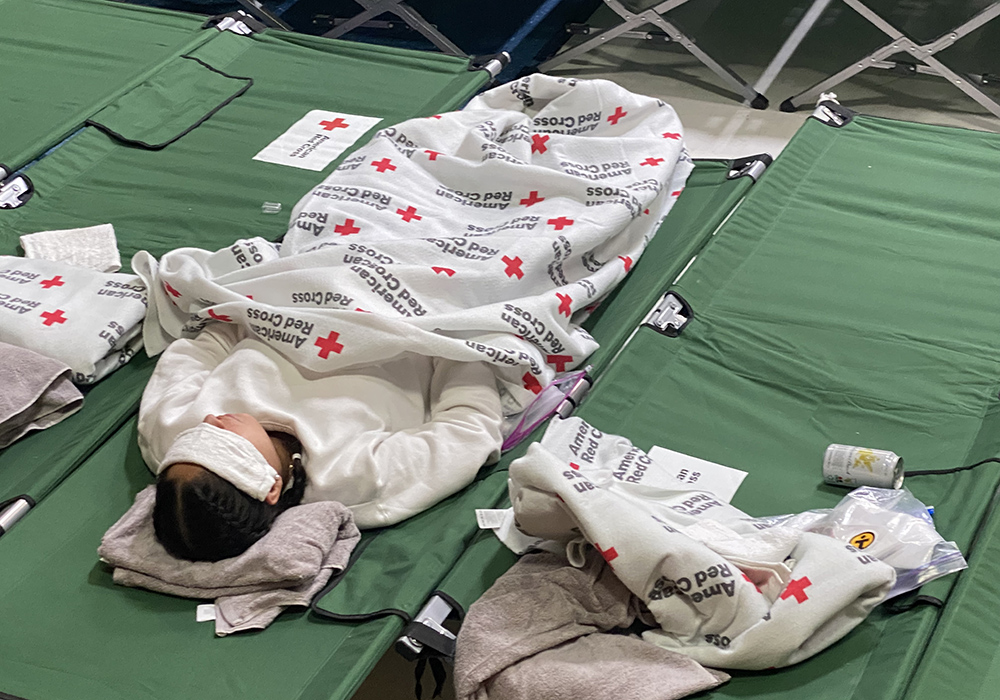
A woman rests on a cot May 13 at a temporary shelter the Diocese of El Paso set up at Our Lady of Assumption Parish in El Paso, Texas. Many migrants arrived at the shelter thirsty, tired and hungry after days or weeks of travel toward the U.S.-Mexico border. (NCR photo/Rhina Guidos)
It's hard to know how many like Urdaneta Border Patrol will release or deport and when.
"We're still dealing with the aftermath of the pre-May 12 surge … and we really want to avoid [a situation] where there are hundreds of people dropped in the streets as temperatures rise. Right now, we're trying to gear up for that," Seitz said.
But first, they're paying attention to the recently released like Urdaneta.
Though she was happy to receive food and shelter, she said she worried about the path ahead, given what she's heard about the anti-immigrant sentiment in the U.S., but staying in Mexico and other countries she traveled through didn't seem like a good choice, she said. Yet with new rules, post-Title 42, that the Biden administration touted through the departments of Homeland Security and Justice in February, migrants must first apply for refuge in another country before applying to the U.S. for asylum.
"A third country, let's say Mexico, is almost like [Venezuelan neighbor] Colombia, where the narcotrafficking makes it a place that's not secure. We don't feel secure there," Urdaneta said. "It scares us because we've seen that in Venezuela. There are places where you have no freedom to walk, not even to go to your backyard."
Advertisement
Meneses said migrants like Urdaneta have the right to apply for asylum in a place where they feel they can have dignity of life.
The new rules being finalized at the moment propose that if a migrant crosses the border illegally, he or she will be banned from entering the U.S. for five years. If caught trying to enter illegally after that, they could face criminal prosecution. Government officials want would-be migrants to first go to processing centers in key places in Latin America instead of heading to the border. But those processing centers are still not open.
While all that plays out, Seitz said the important thing is to lend a hand to those in need. The diocese is asking parishes to volunteer to help the strangers in their midst. Yet some in El Paso and neighboring Juarez, on the Mexican side, have complained about the Venezuelan population passing through, leaving behind discarded clothing and begging on the streets.
Seitz said there's a strong "narrative of chaos" being spread by people who are against the reception of people from other places.
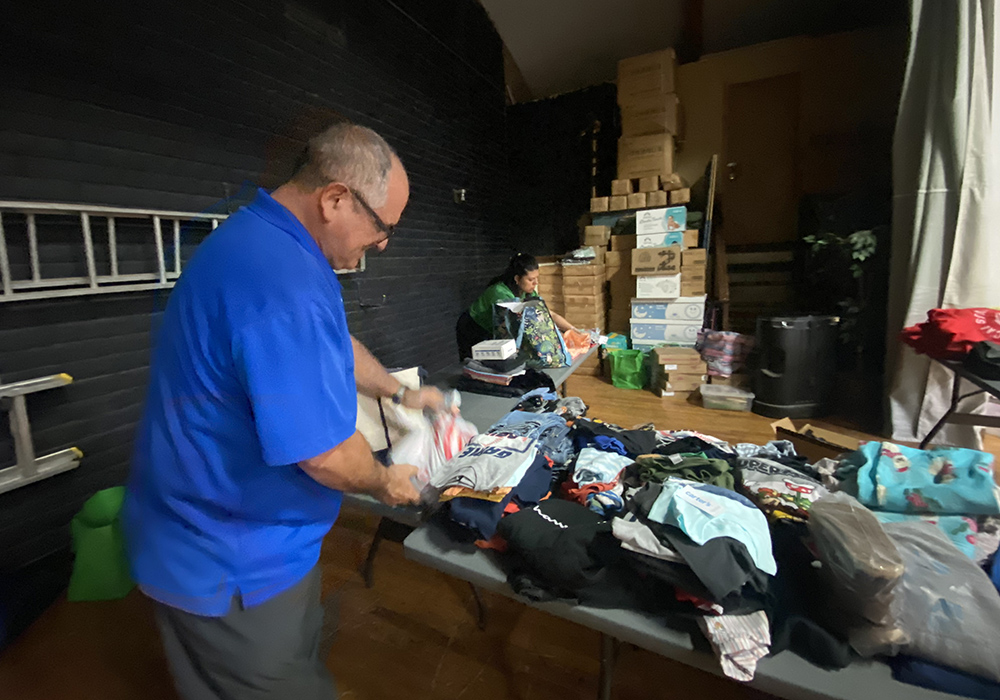
Fr. Gustavo Meneses arranges clothes for migrants May 13 at a temporary shelter the Diocese of El Paso set up to care for migrants at Our Lady of Assumption Parish in El Paso, Texas. Meneses, a member of the Dicastery for Promoting Integral Human Development, who lives in Costa Rica, arrived in El Paso to help the border diocese as some predicted an overwhelming influx of migrants. (NCR photo/Rhina Guidos)
"As Jesus said, 'Do not be afraid.' We're living right here in what many people have called the ground zero of the immigration movement and we work with those who are coming every day, many who are processed by Border Patrol, and many who are not, and in our shelters, we have not had a single incident that I can recall," he said. "What we encounter instead are people who are putting their life on the line because their life was threatened where they were."
It's natural to fear the unknown, said Seitz, but he said he encourages people to look at the Gospel for guidance, at Jesus' words and actions.
"We've been taught by the one who is our leader that we should care for the ones who are the most vulnerable. It doesn't say 'if they haven't done this, if they're not in this situation,' or whatever. I can't find that in the fine print in the Gospel," he said. "All he says is 'I was a stranger and you welcomed me.' All he does is talk to the Samaritan woman or the woman in Tyre and gives her the assistance that she needs. Jesus would not reject people who are desperately in need. It's up to our politicians to set up the orderly processes that we hope for, but it's up to Christians to serve those who are in need."






